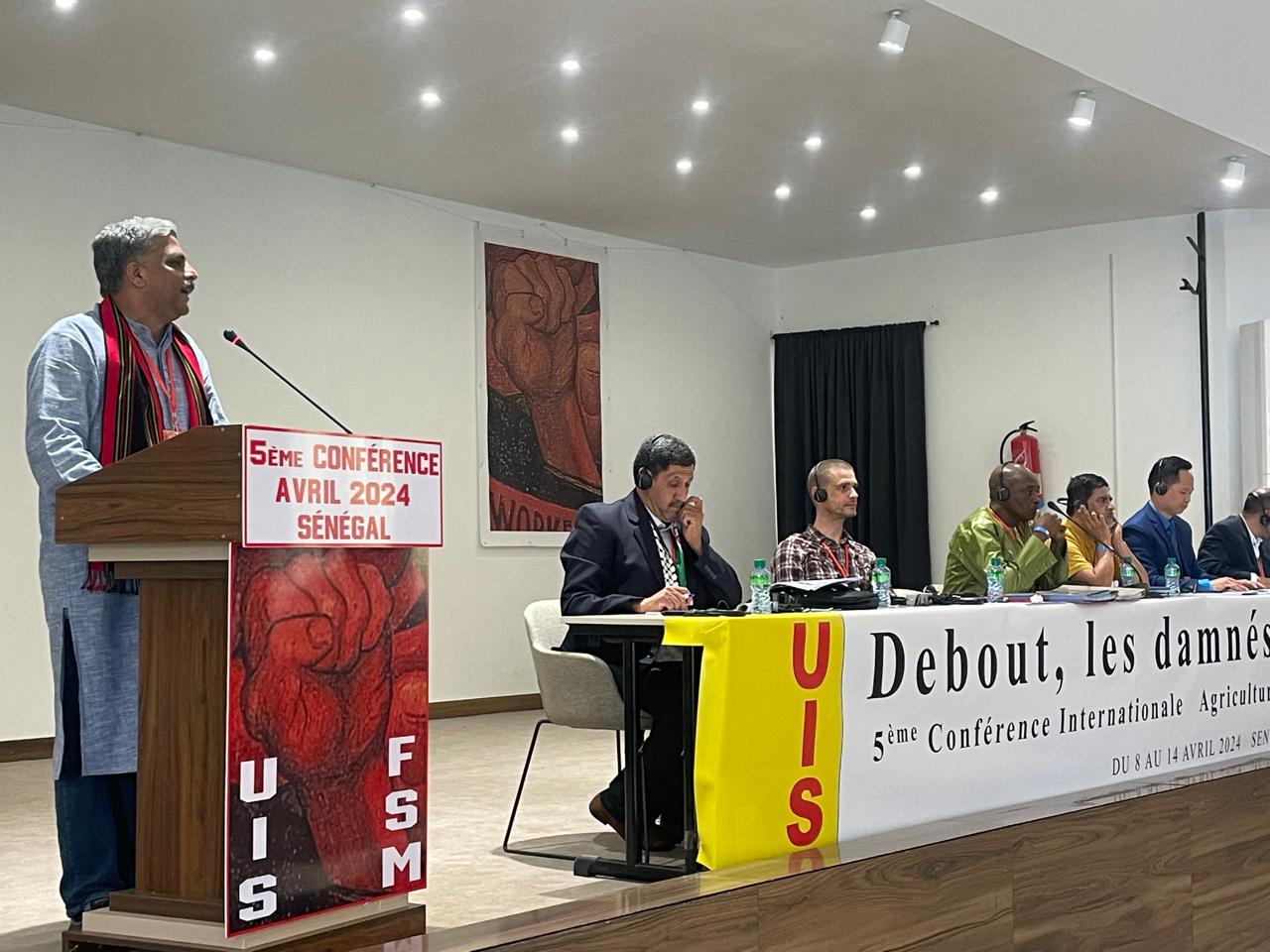AIKS Press Note on Land Acquisition Bill: Congress-led UPA Turns Real Estate Agent For Corporates
30th August, 2013
The Congress-led UPA has pushed through the legislation on land acquisition ignoring the genuine concerns of the farmers and millions of persons dependent on land. The legislation aims to facilitate smooth take-over of land for corporate profiteering and real estate speculation. All India Kisan Sabha rejects this anti-farmer and anti-poor legislation. It shall build broad united movements at all sites of indiscriminate, unjust land acquisition and fight to protect the rights of the peasantry, tenants, agricultural workers and all affected persons.
The Kisan Sabha as well as many other democratic organisations had demanded the repeal of the Land Acquisition Act of 1894 which provided the legal framework for land acquisition till date. There was consensus that this colonial legislation was an instrument of expropriation and for facilitation of land acquisition in a quick, cheap and easy way with little concern for consent, adequate compensation and rehabilitation of landowners and other land-dependents. In response to our demand, the Government has come up with The Right To Fair Compensation And Transparency In Land Acquisition, Rehabilitation and Resettlement Bill, 2012. The Bill only shifts from a “colonial” to a “neo-liberal” legal framework which is as draconian if not more.
AIKS had demanded that all the provisions of the Act must apply in all cases of acquisition without exceptions like the 16 Acts exempted under the Fourth Schedule of the legislation and wanted that the provisions should apply in all cases of private purchase above land ceiling/10 acres whichever is lower without any exceptions. We had demanded that special powers in cases of “urgency” should not be invoked for private companies and be restricted to national defense, and all other processes to seek consent, hear objections and undertake Social Impact Assessment must continue. The Act must have retrospective effect and in all cases where possession of land has not been taken even though land acquisition process has been initiated under the 1894 Act, the process of acquisition shall start afresh in accordance with the new Act. Land should be reverted to the original owners if it is not used for the purpose acquired within a period of 2 years from the date of acquisition. The legislation unfortunately ignores these genuine concerns raised by us.
AIKS had demanded that Public purpose must be clearly defined without any ambiguity, and limited to activities which are of direct benefit to the largest number of people so that it does not include the furtherance of private speculation and profit. We had sought that the definition of Infrastructure Project too should be restrictive based on the principle of quod est necessarium est licitum implying only that much which is actually necessary is legal. We had demanded that land acquisition for PSUs and the Government should be on a different footing from land acquisition for private companies or PPP Projects; in the case of land acquisition for Private Companies and PPP projects, prior approval, mandatory agreement to be strictly regulated by Government and ownership remaining with State must be ensured. The present legislation removes the distinction between acquisition for the State and for Private companies. It will bring Private companies and their activities of unbridled profiteering into public purpose and promote further unregulated takeover of land by corporates.
AIKS had demanded that all land acquisition and land use change should be in conformity with the Land Use Plans of State Governments and Panchayats or Gram Sabhas. Promotion of food security and livelihood security through the adherence to such an equitable and sustainable National as well as State Land Use Plans monitored by Land Use Commissions at respective levels was suggested. AIKS had demanded that rain-fed, dry-land and that all productive land is included while discussing the protection of food security. The legislation indicates that rain-fed, dry-land and semi-arid land is unproductive and their acquisition does not affect food security. This is a flawed understanding and there needs to be protection for such land as well as paddy lands, common property resources too along with multi-cropped, irrigated lands. The present legislation puts the food security of the nation under serious threat as there are no effective safeguards against take-over of agricultural land, paddy lands and water bodies and protection for productive dry-land, rain-fed and semi-arid land although a large majority of cultivation in India is under such regions.
AIKS demanded that all land Acquisition should be based on prior informed consent of affected persons with the least displacement and for a democratically established public purpose. Elimination of forcible land acquisition with mandatory consultation and approval from Panchayats as well as Gram Sabhas and binding nature of Social Impact Assessment (SIA) was what we aimed for. This legislation does not ensure binding nature of Social Impact Assessment nor does it institutionalise the principle of prior informed consent. It gives Collectors undue and over-riding powers thereby rendering the SIA redundant.
The Kisan Sabha demanded that compensation, resettlement and rehabilitation should be treated as an avenue to give those tilling and working the land as well as other land dependents a large share of the augmented value of land after land use change as well as guaranteed employment and livelihood security for all affected persons by making them partners in development. This was sought with a broad definition of “affected persons” to make it more inclusive and remove requirements such as 3 year residence which may become hurdles in establishing legitimacy so that all land dependents (including workers, artisans, common property users will be covered). Compensation and Rehabilitation and Resettlement provisions in the Bill are too meagre and inadequate. Formation of a representative Committee including affected persons and Farmers’ organisations to determine the value of the land, assets, common property resources and loss of livelihood was also suggested which has been disregarded.
AIKS had called for protection of forest dwellers, Dalits, Tribals and other communities in 5th and 6th Schedule areas and demanded that the law prevailing in all Scheduled Areas should prevail over the new legislation and that the provisions of the Forest Rights Act must not be undermined; there should be no forcible acquisition of land from Scheduled Tribes and demanded that full Rehabilitation and Resettlement should precede displacement and start of the Project and that all provisions of compensation, Rehabilitation and Resettlement should be binding with no scope for their non-fulfilment; the displaced families must consent to the R&R package; SC/STs and small and marginal farmers should receive land for land in all cases with the Government being bound to develop and make such land cultivable. The present legislation is ambiguous on many of these issues and has diluted the provisions of
What was demanded was a legislation that will protect the interests of the farmers, tenants, agricultural workers, all dependents on land, Dalits and Adivasis as well as protect the Common Property Resources and safeguard the food security. This legislation is an exercise in deceit which denies the farmers and affected persons their legitimate rights. AIKS will resist any moves to hand-over land for corporate profiteering and without ensuring prior informed consent. This legislation will be defeated by the peasantry and the toiling masses through intense united struggles.
Sd/-
Amra Ram, President
Hannan Mollah, General Secretary


